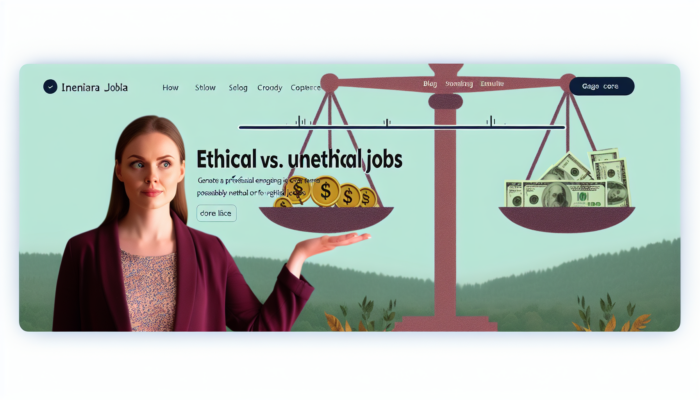In a world where the hustle culture is glorified, many individuals are eager to find a side gig to supplement their income. However, not all opportunities are created equal. Some gigs tread the murky waters of ethics and legality, raising the question: would you take the plunge into an unethical job just for a paycheck? This article invites you to explore some of the most controversial side gigs out there, presenting both the allure and the moral implications of each. Settle in as we dive into the tale of individuals navigating these treacherous waters.
The Allure of Easy Money
Meet Sarah, a single mother juggling two part-time jobs while trying to provide a better life for her children. One evening, while scrolling through her social media feed, she came across an ad promising quick cash for minimal effort. The gig involved filling out online surveys for a hefty reward. Intrigued by the prospect of easy money without much investment, Sarah decided to give it a shot. Little did she know, this seemingly harmless task would lead her down a precarious path.
Survey Scams and the Fine Print
As Sarah began participating in the surveys, she quickly realized that not all gigs are as straightforward as they appear. Many of the surveys required her to provide personal information, and as time went on, she became inundated with spam emails and robocalls. The once enticing opportunity turned into a frustrating experience, and the promised cash never materialized. Sarah learned firsthand that sometimes, the pursuit of easy money can lead to unforeseen consequences.
Online Reselling: A Double-Edged Sword
In her quest for legitimate side gigs, Sarah also stumbled upon online reselling. The idea of purchasing items at thrift stores and flipping them for a profit seemed appealing. She spent weekends hunting for vintage clothing and unique home decor, posting them on various resale platforms. Initially, Sarah enjoyed the thrill of finding hidden gems, but soon, she faced a moral dilemma. Some of her fellow resellers were taking things a step further by reselling stolen goods or items obtained through questionable means.
The Thin Line of Reselling Ethics
As Sarah navigated this new venture, she encountered several individuals who openly discussed their methods of acquiring inventory. Some would raid clearance sales and resell the items for a significant markup, while others would buy from desperate sellers at a fraction of the cost. It sparked an internal conflict within Sarah. She loved the art of reselling but didn’t want to be associated with unethical practices. Ultimately, she had to decide whether to continue in this lucrative market or distance herself from it.
Gig Economy: Driving for Dollars
Seeking a more traditional side hustle, Sarah turned to rideshare driving. The flexibility of choosing her hours and making a decent income appealed to her. However, the gig economy came with its own set of challenges. One evening, while driving a passenger, she was asked to do something that made her uncomfortable: a detour to pick up drugs. Faced with the dilemma of potentially compromising her morals for the sake of a fare, Sarah had to make a choice that would reflect her values.
The Dangers of Rideshare Gig Work
As Sarah navigated her rideshare driving, she encountered more than just questionable requests. She faced unruly passengers, dangerous situations, and the constant pressure of maintaining high ratings. It became evident that while she could earn money driving, the risks were significant. Sarah began to question whether the financial benefits outweighed the personal safety concerns associated with this gig.
Influencer Culture: Ethical Dilemmas in the Spotlight
Meanwhile, Sarah’s friend Jake was diving into the world of social media influencing. He was excited about the prospect of sharing his passion for fitness and earning money through brand partnerships. However, as Jake gained followers, he found himself in an ethical gray area. Brands began approaching him with offers to promote products that he didn’t believe in or use. The allure of sponsorships and free products was tempting, but Jake grappled with the idea of promoting items that didn’t align with his values.
The Cost of Compromising Values
Jake eventually faced a decision. Should he compromise his authenticity to cash in on lucrative deals, or should he remain true to his message and audience? After much deliberation, he chose to turn down several sponsorships that didn’t resonate with his brand. Jake understood that while the money was appealing, authenticity and trust with his followers were far more valuable in the long run.
The Rise of the Gig Economy: Navigating Ethical Waters
As Sarah and Jake shared their experiences, they began to realize the broader implications of the gig economy. While it offers flexibility and the potential for extra income, it also presents ethical dilemmas that can challenge personal values. The desire for financial stability can lead to decisions that may compromise one’s integrity. It became clear to them that the pursuit of money should never come at the expense of one’s morals.
Finding Ethical Alternatives
Determined to find a side gig that aligned with their values, Sarah and Jake began exploring alternative options. They discovered opportunities in freelance writing, graphic design, and online tutoring—gigs that allowed them to utilize their skills without sacrificing their integrity. This shift not only provided them with additional income but also a sense of fulfillment.
Building a Sustainable Future
As they ventured into these new roles, Sarah and Jake found a community of like-minded individuals who prioritized ethical practices in their work. They attended workshops and networking events focused on building sustainable side hustles. The emphasis on collaboration and support in ethical side gigs contrasted sharply with the cutthroat nature of the more controversial gigs they had previously encountered.
The Journey of Self-Discovery
Through their experiences, both Sarah and Jake learned valuable lessons about the importance of aligning personal values with career choices. They realized that while the temptation of quick cash is ever-present, the long-term implications of unethical work can have detrimental effects—on both personal integrity and mental well-being.
Empowering Others: Sharing Their Knowledge
Motivated by their journey, Sarah and Jake decided to share their knowledge with others who might be tempted by unethical gigs. They started a blog, documenting their experiences and offering tips on how to find ethical side hustles. By sharing their stories, they hoped to empower others to make informed decisions about their financial pursuits.
The Bigger Picture: Changing the Narrative Around Side Gigs
As their blog gained traction, they began to spark conversations about the ethical considerations of the gig economy. They encouraged individuals to think critically about the work they choose to pursue and how it aligns with their personal values. Sarah and Jake became advocates for a more conscious approach to side hustles, emphasizing that it’s possible to earn money without compromising one’s integrity.
A Call to Action: Choose Wisely
In a world saturated with opportunities, the allure of quick cash can be tempting. However, it’s essential to navigate these waters with caution. As Sarah and Jake discovered, the ethical implications of side gigs can significantly impact one’s life and career. The next time you’re presented with a seemingly easy opportunity, ask yourself: is it worth the risk? The journey to financial stability doesn’t have to come at the expense of your values. Choose wisely, and you might just find a path that not only fills your pockets but also aligns with who you are.





